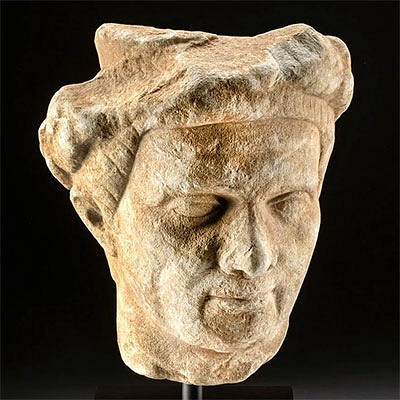Alaskan Aleutian Woven Grass & Wool Lidded Basket
Lot 171
About Seller
Artemis Fine Arts
686 S Taylor Ave, Ste 106
Louisville, CO 80027
United States
Selling antiquities, ancient and ethnographic art online since 1993, Artemis Gallery specializes in Classical Antiquities (Egyptian, Greek, Roman, Near Eastern), Asian, Pre-Columbian, African / Tribal / Oceanographic art. Our extensive inventory includes pottery, stone, metal, wood, glass and textil...Read more
Categories
Estimate:
$1,600 - $2,400
Absentee vs Live bid
Two ways to bid:
- Leave a max absentee bid and the platform will bid on your behalf up to your maximum bid during the live auction.
- Bid live during the auction and your bids will be submitted real-time to the auctioneer.
Bid Increments
| Price | Bid Increment |
|---|---|
| $0 | $25 |
| $300 | $50 |
| $1,000 | $100 |
| $2,000 | $250 |
| $5,000 | $500 |
| $10,000 | $1,000 |
| $20,000 | $2,500 |
| $50,000 | $5,000 |
| $100,000 | $10,000 |
| $200,000 | $20,000 |
About Auction
By Artemis Fine Arts
Jun 1, 2023
Set Reminder
2023-06-01 10:00:00
2023-06-01 10:00:00
America/New_York
Bidsquare
Bidsquare : Ancient | Asian | Ethno | Native American Art
https://www.bidsquare.com/auctions/artemis-gallery/ancient-asian-ethno-native-american-art-12905
Featuring classical antiquities, ancient, and ethnographic art from cultures encompassing the globe. Egyptian, Greek, Roman, Near Eastern, Asian, Pre-Columbian, Native American, African / Tribal, Oceanic, Spanish Colonial, Fossils, more! All legally acquired, legal to sell. Satisfaction guaranteed. Artemis Fine Arts info@artemisfinearts.com
Featuring classical antiquities, ancient, and ethnographic art from cultures encompassing the globe. Egyptian, Greek, Roman, Near Eastern, Asian, Pre-Columbian, Native American, African / Tribal, Oceanic, Spanish Colonial, Fossils, more! All legally acquired, legal to sell. Satisfaction guaranteed. Artemis Fine Arts info@artemisfinearts.com
- Lot Description
Native American, Northwestern United States, Alaska, Aleutian Islands, Aleutian People, ca. late 19th to early 20th century CE. A fine lidded basket that is hand woven from grass and decorated with vibrantly dyed wool. The artist likely used dried wild rye and constructed the piece by twining to strengthen the form, and the sprouting flower and geometric motifs were added during the weaving, and not after, in a technique known as "false embroidery; “winding the wool around the outer weft-strands. The baskets with tight weaves could take up to a year or more to create and were used to harvest and store edible plants and fish, and later used to exchange with Russian fur traders. This is a large and significant example! Size: 11.5" Diameter x 12" H (29.2 cm x 30.5 cm)
During the WWII Japanese invasion of the Aleutian Islands, the US military forcibly evacuated native people to internment camps with incredibly poor living conditions. Pre-war baskets are highly valued by museums and collectors, preserving history as well as the fine skill of Aleutian weaving that was almost lost during this period.
Provenance: private Coeur d'Alene, Idaho, USA collection
All items legal to buy/sell under U.S. Statute covering cultural patrimony Code 2600, CHAPTER 14, and are guaranteed to be as described or your money back.
A Certificate of Authenticity will accompany all winning bids.
We ship worldwide and handle all shipping in-house for your convenience.
#178742Tears to the rim of the lead and around the knob base. Several tears and small holes to body. Some fading to wool, but embroidery and weaving is overall fair to good condition.Condition
- Shipping Info
-
All shipping is handled in-house for your convenience. Your invoice from Artemis Gallery will include shipping calculation instructions. If in doubt, please inquire BEFORE bidding for estimated shipping costs for individual items.
-
- Buyer's Premium



 EUR
EUR CAD
CAD AUD
AUD GBP
GBP MXN
MXN HKD
HKD CNY
CNY MYR
MYR SEK
SEK SGD
SGD CHF
CHF THB
THB














